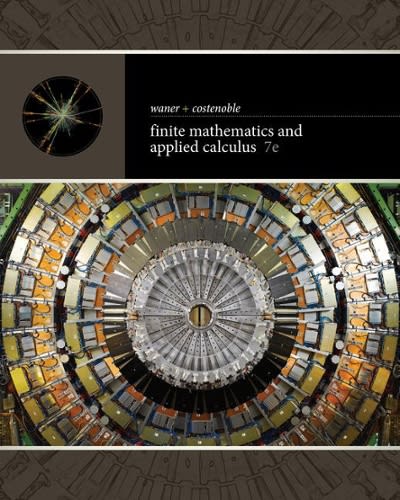Question
The public authority is endeavoring to decide if migrants ought to be tried for an infectious sickness. We should expect that the choice will be
The public authority is endeavoring to decide if migrants ought to be tried for an infectious sickness. We should expect that the choice will be made on a monetary premise.
))16((
Accept that every outsider who is permitted into the country
what's more, has the illness costs the United States $100,000, and
every foreigner who enters and doesn't have the illness
will contribute $10,000 to the public economy. Expect
that 10% of all potential migrants have the sickness. Thegovernment may concede all settlers, concede no workers,
or then again test foreigners for the illness prior to deciding
regardless of whether they ought to be conceded. It costs $100 to test a
inividual for the sickness; the test outcome is either certain or
negative. On the off chance that the test outcome is positive, the individual certainly
has the infection. Be that as it may, 20% surprisingly who do have
the illness test negative. An individual who doesn't have the
illness consistently tests negative. The public's authority will likely
boost (per possible outsider) expected advantages short
anticipated expenses. Utilize a choice tree to help in this endeavor.
Likewise decide EVSI and EVPI.
A standard deck of 52 cards comprises of 4 suits with 13 cards each. Two of the suits, clubs and spades,
dark while the other two suits, hearts and jewels, are red. Each suit comprises of an expert (A), a 2, 3, 4, 5,
6, 7, 8, 9, 10, jack (J), a sovereign (Q), and a lord (K). In this manner, there are 4 of each kind of card (for example a 3 or Q),
one of each suit, in the deck. A test comprises of drawing two cards with substitution (for example the
individual returns the card and rearranges adequately). Answer the accompanying inquiries:
(a) Suppose subsequent to drawing each card the experimenter records the tone (red or dark) of the card
as it were. Work out the example space. (Be cautious! The request in which they are drawn issue!)
(b) Suppose since the experimenter records the specific card (for example 2 of hearts or K of precious stones). How
numerous results are conceivable?
(c) If the analysis is as depicted in 5b, work out the accompanying occasion: "Two red 3s are drawn." How
numerous results are in this occasion? (Once more, be careful that request matters!)
A trial comprises of flipping a coin and additionally rolling a kick the bucket. Answer the accompanying inquiries:
(a) Suppose that the trial comprises of flipping a coin and rolling a kick the bucket and taking note of the outcome in each
case. Work out the example space. What number of results are there?
(b) Suppose that the trial comprises of either flipping a coin or rolling a kick the bucket however not both and recording the outcome in
each case. Work out the example space. What number of results are there?
Assume that you work in the examination oce for one of the state's biggest medical coverage organizations. Your rst task is to contemplate the expense eectiveness of organizing a general test for a sickness called SOS. Your rm is considering making the test free and general for each of the 10 million of its customers in Texas. The actual tests are a signicant cost. However whenever got ahead of schedule, before the beginning of its most noticeably awful manifestations, SOS can be dealt with substantially more expense eectively. This might actually save your rm a lot of cash as it were. You are accused of understanding the properties of the test. We realize that SOS aicts approximately 1 Texan out of each 1000, and we should additionally accept that your 10 million customers are an agent test, everything being equal (so you can anticipate that this base rate for Texas should hold for your customers also). No clinical trial is awesome, however this one is sensibly exact: it gives a positive outcome for 95% of individuals who have SOS, and a pessimistic outcome for 99% of individuals who don't have SOS. Considering these numbers, what is the back likelihood that a patient has SOS, given that they test positive for the sickness?
Step by Step Solution
There are 3 Steps involved in it
Step: 1

Get Instant Access to Expert-Tailored Solutions
See step-by-step solutions with expert insights and AI powered tools for academic success
Step: 2

Step: 3

Ace Your Homework with AI
Get the answers you need in no time with our AI-driven, step-by-step assistance
Get Started


